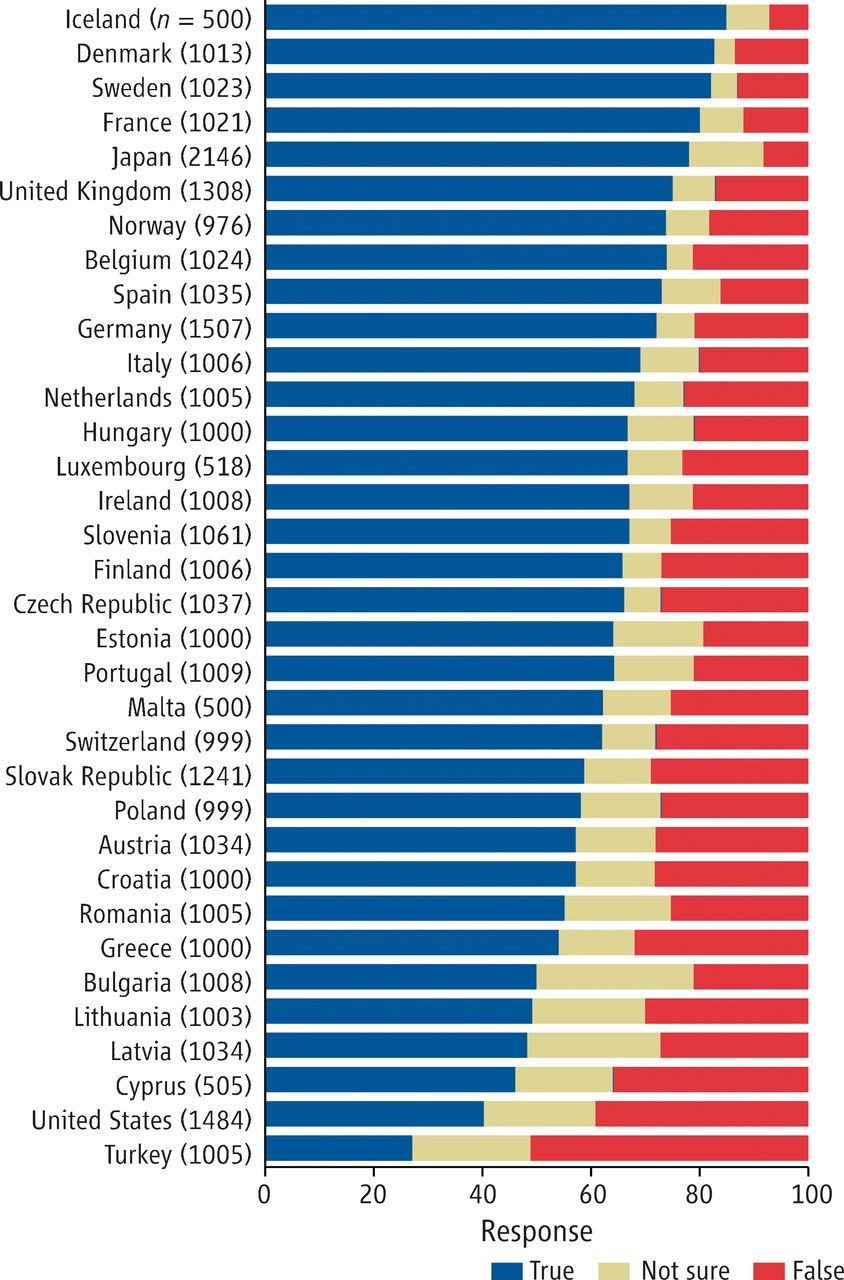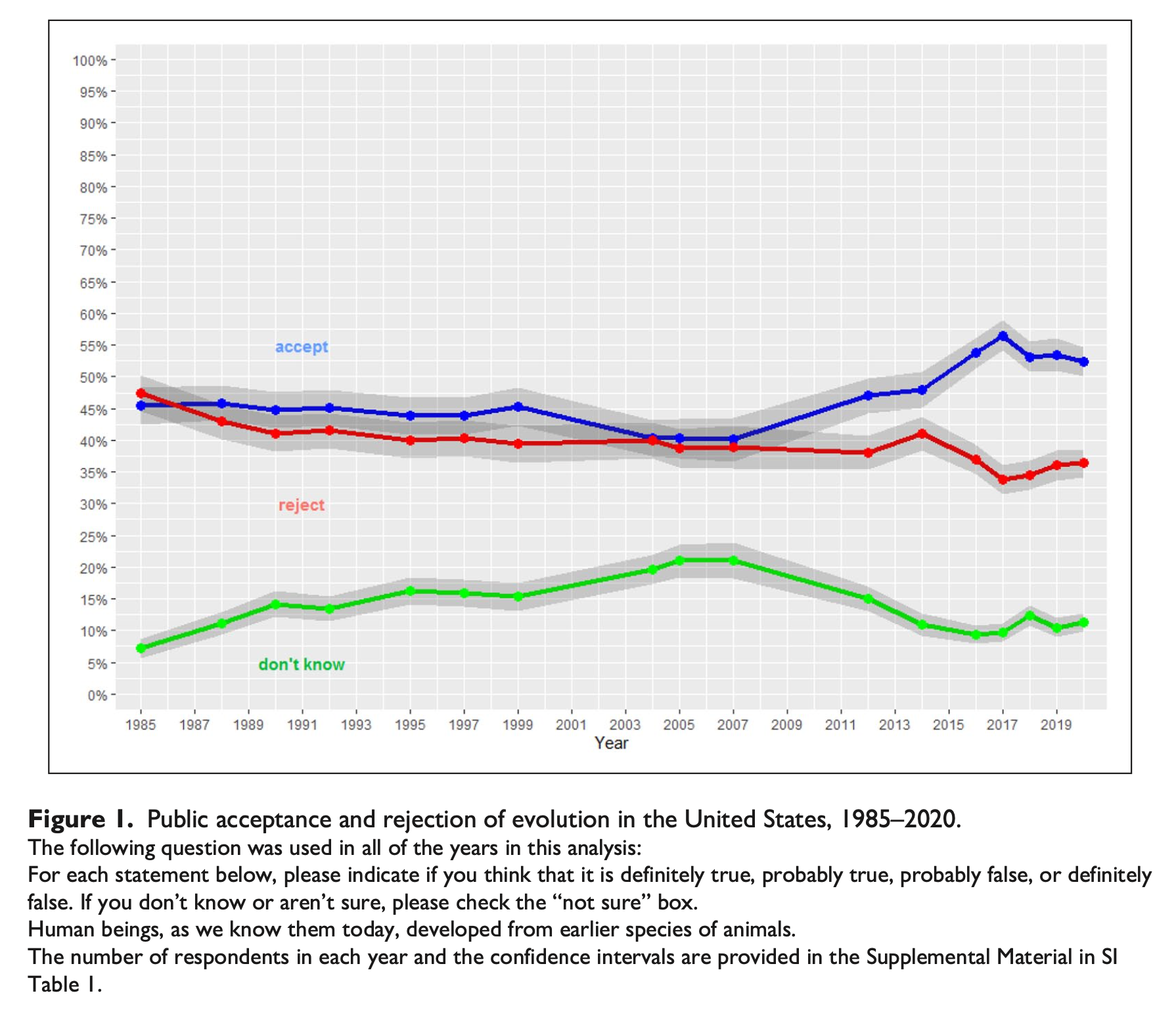More than a decade ago, in 2006, the journal Science published this chart showing the acceptance of evolution in more than 34 countries.

If you’re looking for the United States, we’re the ones waaaaaaay near the bottom of that list, with a paltry 40% of people who accept that evolution is true. The only country lower than us when it came to science literacy was Turkey.
The most recent Gallup poll on the matter, from 2019, found something a little more optimistic. Only 22% of Americans correctly said that humans developed over millions of years with God playing no role in the process. But another 33% of Americans agreed on the “developed over millions of years” bit; they just felt God guided the process. Still, that’s 55% of Americans who accepted evolution.
That’s a very low rate of acceptance of reality. But… yay for being a majority?
We can now add one more useful piece of data to this collection. According to a new paper published in the journal Public Understanding of Science, researchers looked at national surveys collected over the past 35 years to see what the acceptance of evolution looked like over that time. What they found was that the acceptance of evolution “increased substantially in the last decade.”
The surveys they used asked the same question over that entire period of time: Do you agree or disagree with the following statement? “Human beings, as we know them today, developed from earlier species of animals.” (They didn’t ask about God’s role.) They found that, over the past decade, the percentage of Americans who agreed with that sentence rose from 40% to 54%.

“From 1985 to 2010, there was a statistical dead heat between acceptance and rejection of evolution,” said lead researcher Jon D. Miller of the Institute for Social Research at the University of Michigan. “But acceptance then surged, becoming the majority position in 2016.”
Examining data over 35 years, the study consistently identified aspects of education — civic science literacy, taking college courses in science and having a college degree — as the strongest factors leading to the acceptance of evolution.
“Almost twice as many Americans held a college degree in 2018 as in 1988,” said co-author Mark Ackerman, a researcher at Michigan Engineering, the U-M School of Information and Michigan Medicine. “It’s hard to earn a college degree without acquiring at least a little respect for the success of science.”
Wooo! Majority! The number isn’t high enough… but it’s trending in the right direction. So what moved the numbers in the right direction and how can we keep that going? Like Ackerman said, going to college helped:
Completion of one or more college science courses was the strongest predictor of adult acceptance of evolution among the demographic variables…
They also noted a positive correlation with graduating college and a negative correlation with age (older people were less likely to accept evolution), but here’s one that surprised me: Having kids also helped.
Finally, another family demographic of interest is the number of minor children in the respondent’s home. Although we often think of adults as transmitting science information to their children, research in recent decades has shown that many parents learn new science information through helping their children with homework, assisting with science fair projects, and answering questions that occur during science museum visits or the viewing of science-related events on television
Religious fundamentalism is obviously an obstacle for many Americans when it comes to evolution, and so is political partisanship. But overall, the trends are in the right direction. The researchers make it clear they don’t think science deniers are finally flipping sides; rather they believe the “unsure” crowd is accepting reality.
As more Americans get advanced degrees (which they are), they’re getting a basic dose of science education, which is good news. As more Americans move away from organized religion, they’re escaping the kind of anti-science rhetoric heard in so many churches around the country, which is good news. I would also add that as we find more venues for science communicators (YouTube, TikTok, whatever), as much as we know miscommunication thrives, there are also ways for good information to spread to the masses.
So we’re a nation that has a long way to go when it comes to evolution. But if the recent trends are any indication, it’s moving in the right direction.
(Featured image via Shutterstock)




It’s Moving Day for the Friendly ..."
It’s Moving Day for the Friendly ..."
It’s Moving Day for the Friendly ..."
It’s Moving Day for the Friendly ..."